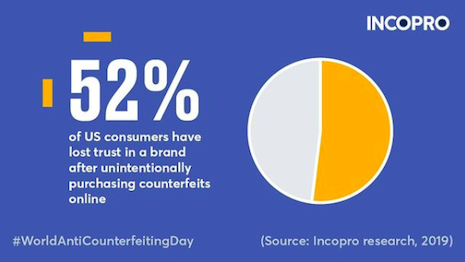- About
- Subscribe Now
- New York,
July 1, 2020

 Counterfeiting ultimately costs a genuine brand the loyalty of its customers. Image credit: Incopro
Counterfeiting ultimately costs a genuine brand the loyalty of its customers. Image credit: Incopro
By Mike Sweeney
Legislative and regulatory pressure on Internet platforms is intensifying.
Initiatives such as the Shop Safe Act in the United States and the Digital Services Act package of measures announced by the European Commission are aimed chiefly at enhancing platform accountability and, as such, are broadly welcomed by the luxury sector.
Brands and consumers seeking to confront threats on online platforms such as social media sites, ecommerce marketplaces and search engines have long been inured to ineffective policies and procedures when it comes to eliminating counterfeits.
Listing issues
Whilst far from perfect, Amazon and Facebook, when notified about a counterfeit, will at least respond and take some action – eventually. Google, prior to a recent development, would not.
Google would not agree to do anything when asked to remove a Web site that infringes trademarks from organic search.
Brands traditionally had first to obtain a court order – with all the cost and inconvenience that this entails – before Google would agree to evaluate trademark infringement.
Baidu, by contrast, purports to welcome notifications in relation to trademarks.
This has long been a major issue for luxury brands. The nature of luxury goods is such that they are faked and brought to market unlawfully on a scale unlike almost any other.
Bad actors have long ditched traditional bricks-and-mortar shopfronts in favor of the freedoms and relative impunity made possible by the digital world where they can enjoy instant access to a near-limitless, global market, fueled by the tremendous power of search engines.
The rigidity of Google’s position in this area has made it all but impossible for luxury brands to secure appropriate and effective relief.
The scale of the issue for luxury brands is so colossal that it is simply not realistic to expect that brands will seek to obtain court orders each time they want to request that a Web site be de-indexed from organic search. This means that luxury brands have typically had to prioritize one search related threat over another, whilst never tackling the problem at source.
Stakeholders have long campaigned for change in this area. Incopro, for example, released a research study in October 2019 that found that, depending on the sector, up to six in 10 Google search results led online shoppers to Web sites offering for sale fake goods.
Soul searching?
In June, Google implemented changes to its policy, leveling up trademarks with copyright. Google has allowed users to issue DMCA-style copyright notifications for some time.
The timing of the change is striking. In an apparent volte face, Google now no longer requires brands to secure a court order and is prepared to remove from organic search results individual URLs which are notified to it, which infringe trademarks and which link to Web sites selling counterfeits.
Whilst many correctly acknowledge this as a positive step forward, it is clear that much more can and should be done.
Google continues to do nothing about Web sites, comprising potentially tens of thousands of individual URLs, even where those sites are dedicated to infringing trademarks and serve no legitimate purpose.
Many Web sites will “self declare” themselves to be infringing through, for example, using the word “fake” adjacent to a brand incorporated within the domain name used to operate the site.
Still, Google will do nothing. The result is that brands are left in the unsatisfactory position of having to notify Google of each individual URL – a daunting task occupying precious resources, which could plainly be better directed elsewhere.
Through its inaction, Google continues to place a significant burden on rights holders seeking to protect their brands and their consumers.
LUXURY BRANDS can and should continue to lobby for further change.
As the legislative and regulatory framework in this area constricts platforms ever tighter, the opportunity for luxury brands to drive meaningful and lasting change in platform behavior widens.
Exerting maximum, collective pressure in this area gives the best chance of making the Internet better for businesses and their consumers.
 Mike Sweeney
Mike Sweeney
Mike Sweeney is London-based director of service delivery and senior legal counsel at technology and brand protection firm Incopro. Reach him at michael.sweeney@incoproip.com.
Share your thoughts. Click here